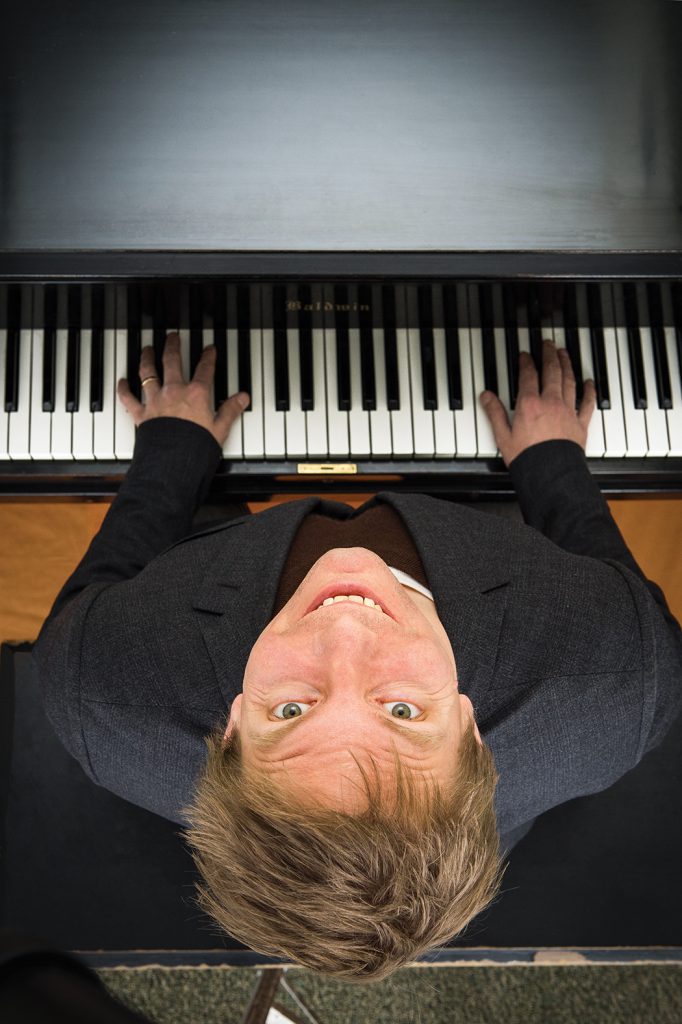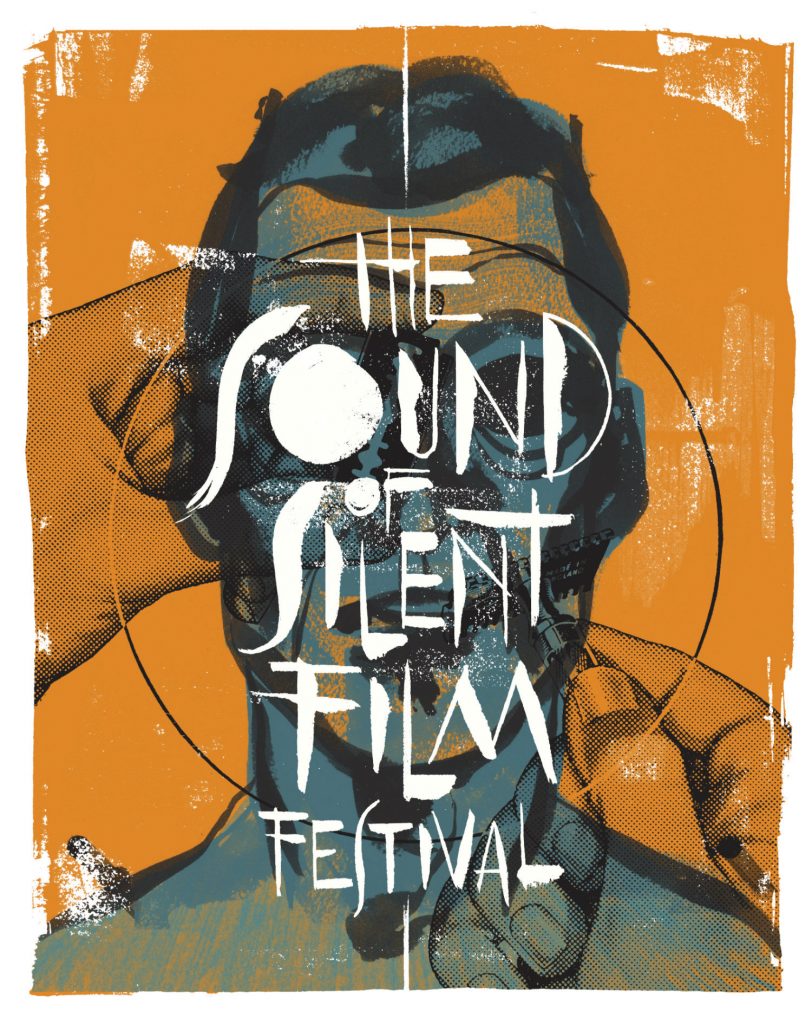Whether he’s talking about composers on his internationally syndicated radio show or meeting with them in China, Chicago and points in between, Seth Boustead’s message is this: Classical music is not dead.
Set aside then, at least for now, classics by centuries-old icons like Beethoven, Bach, Mozart and Tchaikovsky. Boustead, a Roosevelt alumnus with bachelor’s and master’s degrees in Music Composition from Roosevelt’s Chicago College of Performing Arts (CCPA) in 2000 and 2002, believes classical music’s golden era is happening right now.
“Seth Boustead is a leading voice for today’s classical music,” said Henry Fogel, CCPA dean. “In addition to being a fine composer, he is one of the best promoters of new music, which is a unique talent to have and an important niche to fill.”
Known for his energy, casual attire and innovative ideas regarding ways new music can be spread more widely, the 42-year-old arts leader and composer seeks, more than anything, to change negative perceptions. That means not giving credence to complaints that today’s classical music is too atonal, just noise, hard to follow, academic, difficult to relate to and so on.
“Seth went out and created his own career, and that’s a powerful example for anyone coming out of music school.”
Linda Berna, director of CCPA’s Music Conservatory
“It used to hurt me when I heard those things,” said Boustead, who is president of Access Contemporary Music (ACM), an organization he started as a Roosevelt student. “Now I’m bold, just taking the ball and running in a lot of directions.” Many directions, indeed. Boustead has his hand in numerous projects relating to today’s classical music.
Featuring the latest in modern classical music, Boustead’s “Relevant Tones,” a weekly radio show based at WFMT in Chicago, reaches a quarter-million listeners in 188 markets, including New Zealand, Canada, the Philippines and dozens of U.S. cities.
“It seemed like a risk at first,” said Jesse McQuarters, a WFMT producer who met Boustead in 2007 when he was performing one of Boustead’s compositions for double bass. A few days later, Boustead called McQuarters with a proposal for a new show. “Nobody was asking for a new-music program,” said McQuarters, who pitched the idea to the station anyway, as Boustead was so enthusiastic and enigmatic. “It’s gone far beyond what we ever anticipated,” added McQuarters of the 3-year-old program which was syndicated last year. “That’s part of Seth’s genius: He’s such an advocate for living composers and new music that he’s been able to get listeners to financially support the show.”
Another of Boustead’s ideas is the Composer Alive series, which streams a winning piece of music in installments on the ACM website. In its ninth season, Composer Alive has engaged lovers of new classical music in learning the craft of composing. Winning compositions have come to ACM from Poland, Brazil, New York, Canada, Japan, Mexico, Paris, Ireland and China.
“There are organizations you join just because you’re a composer,” said Alyson Berger, a cellist and ACM board member. “Most of them don’t help composers get their music out. That’s what makes this unique.” One way ACM does this is by commissioning composers to write pieces for significant spaces that are open to the public for tours.
“Too often, people think new classical music is weird, but Seth has succeeded in breaking down the barrier,” said Lynn Osmond, president of the Chicago Architectural Foundation’s Open House Chicago. In 2014, the event attracted thousands to Chicago locations where new pieces were played, including the Old Women’s Lounge at Union Station and Tip Top Tap at the Allerton Hotel. “The music certainly brought the spaces to life,” said Osmond, who said she hopes the concept continues to flourish. In fact it has, as Boustead is commissioning composers to write music for spaces at Open House Milwaukee and Open House Helsinki.
The idea also inspired Tim Corpus, a 2010 Roosevelt percussion performance graduate and composer to write “Letters from Home,” a piece capturing the mumbling voices of waiting passengers. It premiered at Union Station and also was featured in a CNN Money segment about ACM, a 2014 nominee for a Chicago Innovation Award.
“Composers can be awkward people who tend to want to be off somewhere by themselves, but Seth’s not like that. He’s approachable, engaging and empowering,” said Corpus, who is currently writing three pieces for the New American Timpani project that will premiere in spring 2016 at Roosevelt.
Also promising for ACM has been The Sound of Silent Film Festival, a Boustead creation pairing new scores with modern silent films. Started in Chicago in 2005, the concept recently debuted in New York, San Francisco and Austin, Texas. “You can do these kinds of films set to new music in any country in the world,” said Boustead, who has been composing classical music for much of his adult life.
Boustead, unlike many aspiring composers, never pursued a PhD. “This is not your typical music student who wants to be a member of an orchestra or a college professor,” said Linda Berna, director of CCPA’s Music Conservatory. “Seth went out and created his own career, and that’s a powerful example for anyone coming out of music school today.”
Anything but conventional, Boustead left the University of Missouri with 12 credits remaining for a bachelor’s degree in Music Composition. He moved to Chicago on a lark at 21 years of age to play piano for Chicago’s Annoyance Theatre, performing off-the-cuff sing-alongs nightly for unruly audiences. He also answered phones at a call center and worked alongside CCPA students at the Carl Fischer Music Store, formerly on South Wabash Avenue, where he got the idea to finish his bachelor’s in Music Composition at Roosevelt.
“You can ask students in class any time, ‘How many of you have ideas for new music compositions?’ Most if not all of their hands will go up,” said Stacy Garrop, a Roosevelt music composition professor whose first student was Boustead. “But to succeed, you have to figure out how to promote your ideas – and Seth has done that,” added Garrop. “He’s definitely one of our best success stories.”
Boustead always has had a flair for promotion, going back to his time at Roosevelt when he attracted nearly 100 people to his graduate recital by using flyers of his face photo-shopped atop a bust of Beethoven with the headline: “Come Explore the Works of Boustead, Boustead and Boustead.”
“He was funny and smart and I remember us hitting it off quickly,” said Roosevelt alumna Laura Koepele-Tenges (MM, ’97), a former flutist and lover of new classical music who met Boustead while she was a CCPA administrator. “One day we were kicking around ideas. I remember saying ‘Wouldn’t it be great if new music was played more often?’ and Seth saying ‘We’re living in an exciting time. Why is this music being held back?’”
The two joined together in 2000 and formed the first rendition of ACM, performing in churches, gymnasiums, coffee shops and any venue that would have them for free. Then Boustead dreamed up Weekly Readings, a series that brought musicians out regularly to record new music. “It was a ludicrous idea really, and I didn’t think it would go anywhere,” said Boustead, who wrote up and sent out press releases calling for new scores.

Access Contemporary Music runs the fourth largest music school in Chicago and plans are being made to open storefront music schools in cities nationwide.
He received more than 100 submissions and a write-up in Chamber Music Magazine, which credited him with “breaking a new trail.” The recordings were posted on the ACM website, streaming music clips before Sound Cloud or iTunes existed.
Boustead is planning for ACM’s expansion nationwide, not through performances, but with storefront music schools that attract passersby to sign up after they see lessons-in-progress in the schools’ storefront windows.
“He (Boustead) knows that if we’re going to make it we can’t just be a performing ensemble,” said Randall West, an ACM board member with a 2009 master’s in Music Composition from Roosevelt. In West’s words, “There’s always something rolling at ACM,” which now has four Chicago spaces and also is the city’s fourth-largest music school. “There’s this synergy as a result of all these things happening and it’s inspired Seth to broaden the reach further.”
That includes Boustead’s work as a composer. In fall 2014, he and fellow Roosevelt music composition and saxophone performance graduate Amos Gillespie (MM, ’05) released “1,001 Afternoons in Chicago,” a CD with music and narratives on the writings of late Chicago journalist Ben Hecht. It caught the attention of Chicago Tribune critic Rick Kogan.

Seth Boustead is host of “Relevant Tones”, a weekly syndicated radio show about new classical music that reaches a quarter-million listeners around the globe.
“Seth’s inventive championing of the work of Ben Hecht is a remarkable thing, bringing back to life in words and music one of the great writers of the 20th Century,” said Kogan, who has had Boustead as a guest on his radio show. “Seth has some terrific work under his belt and a bright future ahead.”
The future according to Boustead means new classical music must continue to thrive. “I keep telling everyone this: ‘If I get run over by a truck tomorrow, I want you to see that modern classical music continues as a living, breathing part of our planet. Promise me, you’ll keep the movement rolling.’”
Listen In
Relevant Tones is a weekly exploration of the most fascinating time in classical music: right now. From up-and-coming firebrands to established artists, this program celebrates the dynamic and diverse musical creations of modern-day composers from around the world.
» Saturdays at 5 p.m. CST, 98.7 WFMT-Chicago
Access Contemporary Music strives to present classical music as a thriving, global art form in the 21st century and beyond by fostering the creation and appreciation of new works by living composers and bringing those works to new and diverse audiences through collaborative projects, innovative commissions and dynamic public performances of the highest artistic quality.
»Learn more: http://www.acmusic.org
SethBoustead.com
»Latest tracks: http://sethboustead.com/works
[soundcloud url=”https://api.soundcloud.com/users/5592480″]



